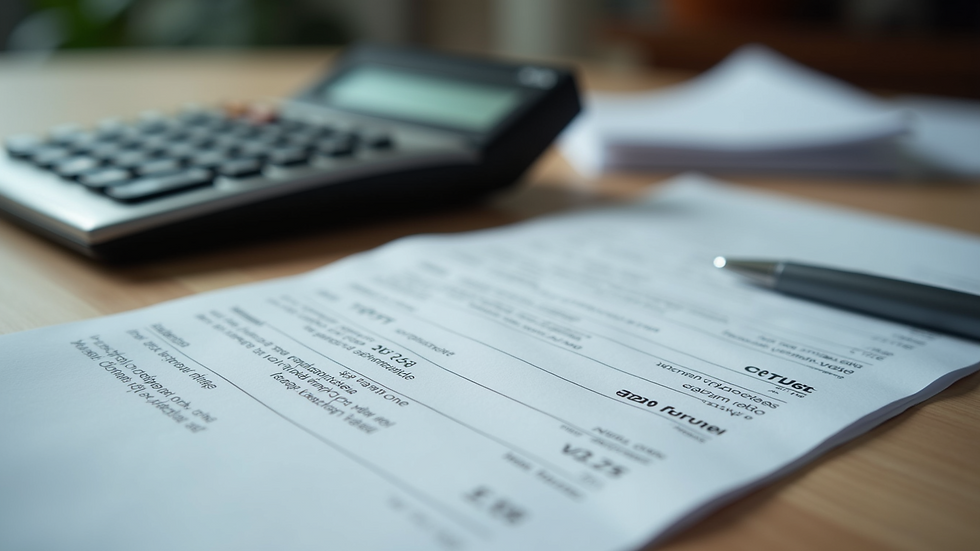Tax Planning Essentials for Freelancers
- Nov 4, 2025
- 4 min read
Let me tell you something right off the bat: taxes can be a real headache when you’re freelancing. I’ve been there—scrambling to organize receipts, wondering if I’m missing deductions, and stressing over quarterly payments. But here’s the good news: with a little know-how and some smart habits, you can take control of your finances and make tax season way less painful. Today, I’m sharing some freelancer tax tips that have helped me stay on top of my game and keep more money in my pocket.
Why Freelancer Tax Tips Matter More Than You Think
Freelancing is awesome—you get flexibility, you pick your projects, and you’re your own boss. But that freedom comes with responsibility, especially when it comes to taxes. Unlike traditional employees, taxes aren’t automatically withheld from your paycheck. That means you have to be proactive about setting aside money and understanding what you owe.
Here’s the kicker: if you don’t plan ahead, you could end up with a nasty surprise come tax time. I once underestimated my quarterly taxes and had to scramble to pay a big bill in April. Not fun. But after that, I learned to budget better and keep detailed records.
Some quick freelancer tax tips to keep in mind:
Set aside at least 25-30% of your income for taxes. This covers federal, state, and self-employment taxes.
Track every expense. From your laptop to your internet bill, many costs are deductible.
Pay quarterly estimated taxes. Don’t wait until April to pay everything.

Essential Freelancer Tax Tips to Keep You Ahead
Let’s dive into some practical tips that can make a real difference:
1. Keep Your Records Organized
I can’t stress this enough. Good record-keeping is your best defense against tax headaches. Use apps or spreadsheets to track income and expenses as they happen. Don’t wait until the last minute to dig through piles of receipts.
Pro tip: Scan or photograph receipts and save them digitally. This way, you won’t lose anything, and it’s easier to categorize expenses.
2. Understand What Expenses Are Deductible
You might be surprised at what you can write off. Here are some common deductible expenses for freelancers:
Home office space (if you have a dedicated area)
Office supplies and equipment
Software subscriptions
Internet and phone bills (proportionate to business use)
Travel expenses related to work
Professional development and courses
Remember, the IRS expects these expenses to be “ordinary and necessary” for your business. Keep detailed notes on how each expense relates to your work.
3. Don’t Forget About Self-Employment Tax
This one trips up a lot of freelancers. Self-employment tax covers Social Security and Medicare contributions. It’s about 15.3% of your net earnings. Unlike employees, you pay both the employer and employee portions.
Here’s the silver lining: you can deduct half of your self-employment tax when calculating your adjusted gross income. It’s a bit of a relief, but you still need to plan for the full amount.
4. Pay Estimated Taxes Quarterly
This is a game-changer. Instead of waiting until April, you pay taxes four times a year based on your income. It helps avoid penalties and spreads out the financial burden.
Mark your calendar for these deadlines:
April 15
June 15
September 15
January 15 (of the following year)
If your income fluctuates, estimate conservatively and adjust as you go.
5. Consider Hiring a Tax Professional
I get it—taxes can be overwhelming. Sometimes, it’s worth investing in a CPA or tax advisor who understands freelancing. They can help you maximize deductions, avoid mistakes, and plan for the future.
If you’re just starting out, many professionals offer affordable consultations or packages tailored to freelancers.

How to Make Tax Planning Work for You
Tax planning isn’t just about avoiding penalties—it’s about making your money work smarter. Here’s how I approach it:
Budget with taxes in mind. When I get paid, I immediately transfer a portion to a separate savings account for taxes. This way, I’m not tempted to spend it.
Review your finances monthly. I check my income and expenses regularly to adjust my estimated tax payments.
Plan for retirement. Freelancers don’t have employer-sponsored plans, so I contribute to an IRA. It reduces taxable income and builds my future.
Stay informed. Tax laws change, and staying updated helps me avoid surprises.
If you want to dive deeper into tax planning for freelancers, there are great resources out there that break down the details and offer personalized advice.
Tools and Resources That Simplify Taxes
You don’t have to do this alone or with just a calculator and paper. Here are some tools I’ve found invaluable:
Accounting software: QuickBooks Self-Employed, FreshBooks, or Wave help track income and expenses automatically.
Receipt scanning apps: Expensify or Shoeboxed make it easy to digitize and organize receipts.
Tax filing software: TurboTax Self-Employed or H&R Block offer freelancer-specific guidance.
Financial planners or tax advisors: For personalized help, especially if your income grows or gets complicated.
Using these tools can save you hours and reduce stress.
Taking Control of Your Financial Future
Freelancing is a journey, and mastering your taxes is a big part of it. It’s not just about compliance—it’s about empowerment. When you understand your tax obligations and plan ahead, you gain confidence and freedom.
Remember, the goal is to avoid common money pitfalls and build financial stability. It’s about making sure your hard work pays off—not just in the moment, but for years to come.
So, what’s your next step? Maybe it’s setting up a dedicated tax savings account or scheduling a chat with a tax pro. Whatever it is, start small and build from there. You’ve got this.
If you want to explore more tips and strategies, check out tax planning for freelancers for expert advice tailored just for you.




Comments